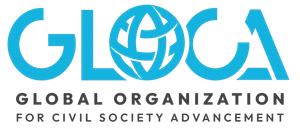Aleppo Governorate Hosts Official Dialogue on Reframing Security as a Public Service

As part of its continued efforts to strengthen collaboration between civil society and public institutions, the Global Organization for the Advancement of Civil Society (GLOCA) organized an official meeting with the Governor of Aleppo on Sunday, 13 July 2025. The meeting, held at the Governorate building, brought together key local officials and GLOCA’s leadership to discuss pathways for promoting good governance and redefining security in a way that respects human dignity and rights.
The session came at a time when Aleppo is undergoing significant institutional and administrative transformations following liberation, with a shared vision to move beyond the inherited model of coercive authority. Instead, participants emphasized the need for a new concept of security as a service to protect communities and uphold citizens’ rights.
From Coercion to Community Care
In his remarks, the Governor of Aleppo stated that the post-liberation governance model is no longer one of repression, but one that seeks to protect the rights and interests of the population. He acknowledged the ongoing battle to correct deeply rooted misconceptions about authority—misconceptions that persist due to past traumatic experiences under authoritarian rule.
He emphasized that regaining public trust is the central challenge, and that this can only be achieved by involving communities in identifying their priorities and by timing reforms carefully to ensure they are both needed and understood.
Community as a Partner in Governance
Mr. Wassim Alhaj, Executive Director of GLOCA, stressed that effective civic work requires the meaningful participation of all segments of society in designing programs and shaping policy—especially in areas related to public services, security, and development. He affirmed that responsibility lies not only with institutions, but also with society itself to take part in shaping solutions, not just awaiting them.
He added that GLOCA has long been committed to building trust between citizens and institutions, promoting an environment of transparency, accountability, and inclusive participation as the foundation for a stable and cohesive society.
Toward a Human-Centered Approach to Security
Participants agreed that the current phase demands a shift away from “authoritarian security thinking,” and instead toward the principle that security is a right and a public good, not a tool of fear or control. This transformation, they noted, must be supported through collaborative efforts between official bodies and civil society.
The meeting also provided space for the exchange of practical ideas on reform mechanisms and ensuring that community voices are reflected in priority-setting and decision-making processes.
A delegation from the Geneva Centre for Security Sector Governance (DCAF) also attended the meeting as part of their field visit to Aleppo.
Gallery







